Backpacking Hong Kong on a Budget
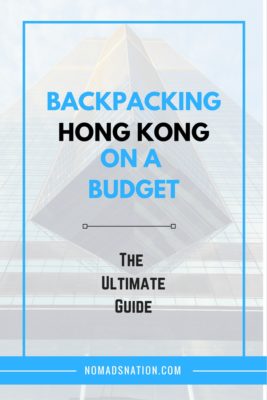
[thrive_2step id=’10052′]Free PDF Version![/thrive_2step]
Hong Kong is one of a kind. It’s a clean, modern, safe and vibrant city, with a very unique energy. The atmosphere is great, the sights are worthwhile, and the food is world class. Here’s NomadsNation guide for backpacking Hong Kong on a budget.
An Introduction
Hong Kong is a special administrative region of China, and is currently using a “one country, two systems” policy. Excluding defense and foreign affairs, this system enables Hong Kong to maintain it’s autonomy from mainland China until 2047. Contrary to most of the mainland, Cantonese, not Mandarin, is the official language.
A British Colony for ninety-nine years, Hong Kong was released from the rule of the Queen in 1997, but the effects of English influence here can still be felt. Western culture and English language is everywhere; street signs, advertisements, restaurant menus and most everything in between. Because of this influence, Hong Kong is one of the more unique examples of East meeting West.
My Budget in Hong Kong
In six and a half days in HK I dropped $282 total, leaving my daily budget to be $42 a day. Please be aware, while in Hong Kong I stayed with friends who lived in Hong Kong teaching English. I did not pay for lodging, which, depending on your travel preferences, can be the greatest financial burden when traveling to this great city. More on that below.
My goal in HK was to spend less than $50 a day. Mission accomplished. Also, considering the fact I did not have to pay for accommodation, and that I was surrounded by great friends for my birthday week, I was OK splurging a bit more on alcohol than usual. Had I no free lodging, I would have probably splurged slightly less to keep the trip at a more reasonable budget.
Milk Tea (Dong Lai Cha) (港式奶茶)
Normally I wouldn’t preface a NomadsNation Official Budget Guide like this. But this isn’t a normal situation. This is a milk tea situation. Hong Kong has the greatest milk tea in the world. Milk Tea is a combination of mysterious magical liquids that when combined create the greatest beverage the gods ever bestowed upon humanity.
It looks like coffee. It’s not coffee. If you’ve never had it before you will never understand it without trying it. I could go on and on describing just how amazing it is, but it would be pointless. Just know I drank three a day, one with every meal, and could have drank three more.
Visa
90 days on arrival for most (Europeans, Canadaians, USA-ians, etc.). Check here for more info.
Language
As previously mentioned, Cantonese is the official language in HK, and although it shares the same characters with Mandarin, they are mutually unintelligible. Understanding of English varies greatly depending on which part of the city you are, but most Hong Kong-ians can understand a bit of conversational English. Much of the younger generation speaks fairly well to fluent English. Cantonese speakers are very proud of their language, and any attempt to speak it is typically met with an enormous smile and genuine sense of appreciation. Learning some basics (hello, thank you, etc.) goes a long way.
What to Do
As a world city, HK obviously has an unlimited amount of sights and activates. But, my favorite thing anywhere in the world to do is walk the city, and feel it slowly, from streets, witnessing life go by. Hong Kong is statistically one of the safest cities on the planet, therefore, my highest recommendation for Hong Kong is to walk around, and get absolutely lost.
Grab a milk tea, walk the streets, observe the sounds, notice the locals, and turn some random corners until you have no idea where you are. It is safe, it is spectacular. Then, as you walk, you will inevitably build up an appetite, which enables you to do the next best thing in Hong Kong.
What to Eat (Brace Yourself)
When it comes to food, Hong Kong is an absolute monster. There are few places in the world you can eat such amazing, unique, world class food, at such an affordable price. It’s a fact, and is the largest contributing factor to my love for this city. You eat like a king, and pay very little for it.
For a more foodie-approach to the cuisine of HK, check out this blog post, Eleven Best Dishes from Hong Kong. It’s a NomadsNation Official Food Power Rankings, full of recommendations and some damn great photographs of some damn great food.
Food cost can vary. Let’s start with the most economical.
Street Food
Hong Kong is full of some of the worlds best street food, all of which is at an affordable price. Street food in this city aren’t full meals, but more like grab-and-go quick snacks. Above were some pork dumplings purchased on the side of the road. They were insanely good and cost 8 HK ($1) for all three.
Like tea? Want a little pick-me-up? Delicious and strong black tea served in bad ass porcelain cup for again 8 HK ($1).
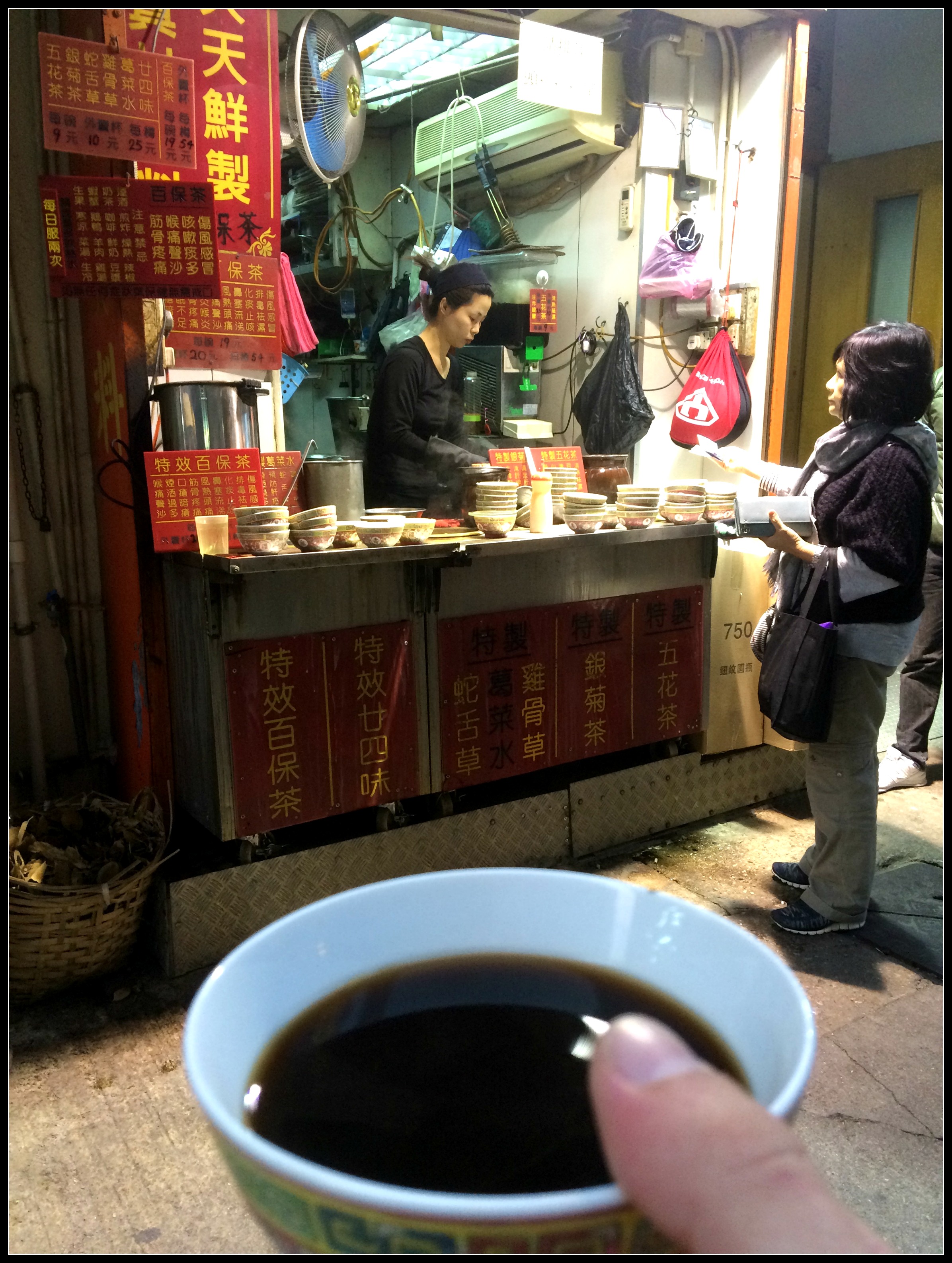

How about something more interesting?
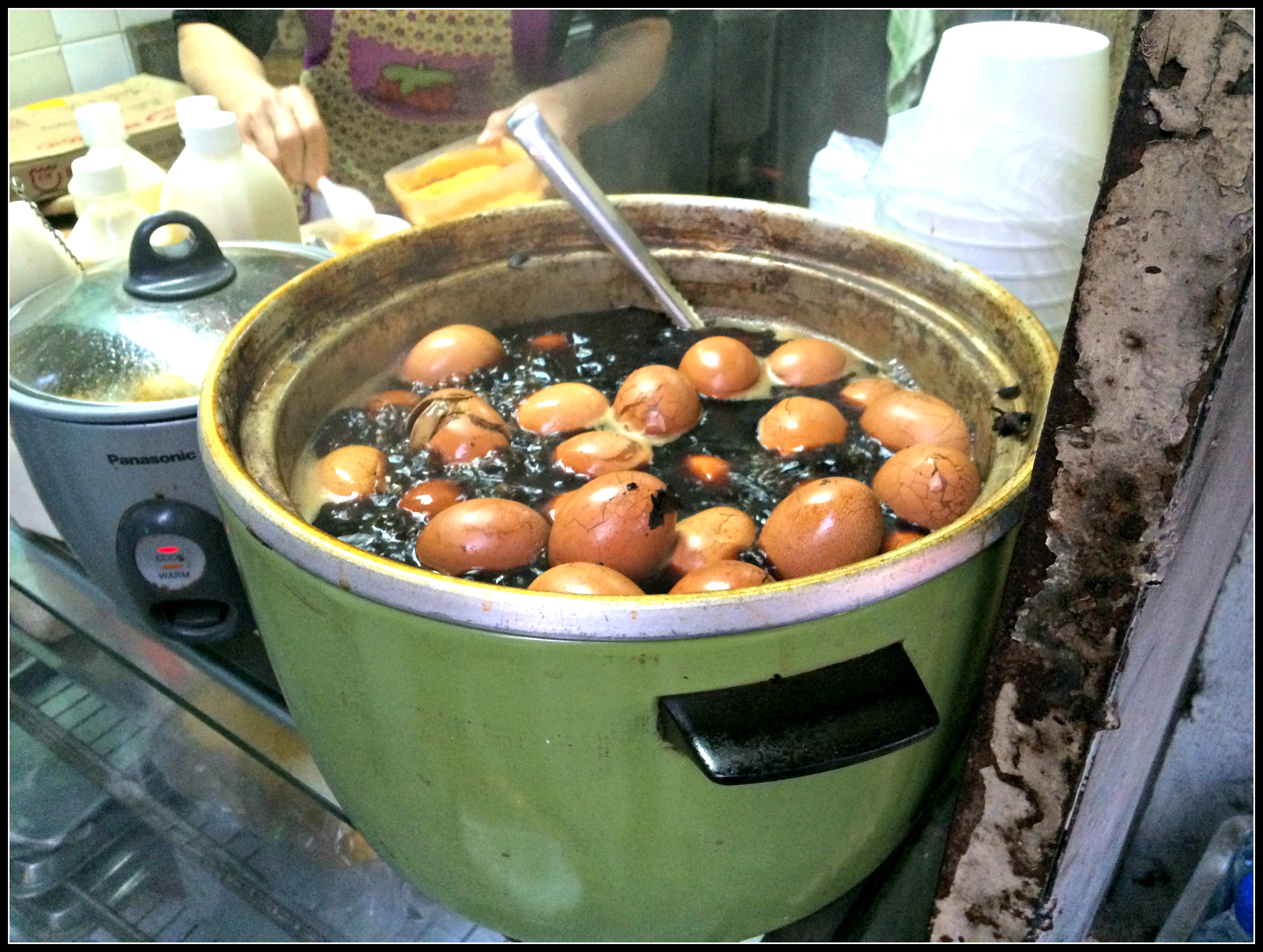

Chan Yip Dan. Eggs boiled in black tea. Three for 10 HK ($1.29)
How about something more more interesting?
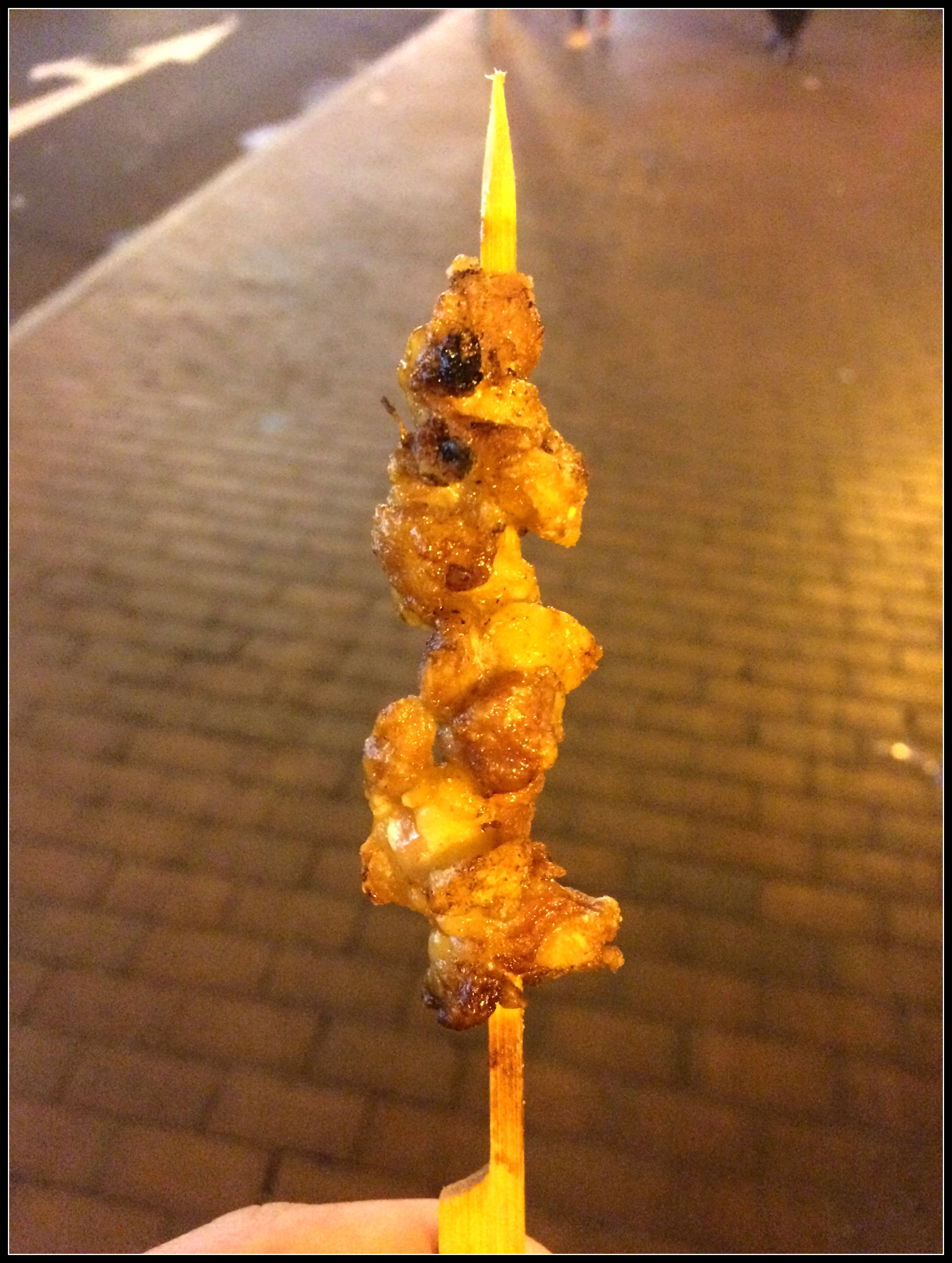

Chicken cartilage is a tasty crispy snack that runs about 10 HK ($1.25).
Not Street Food
From there, we move to sit down restaurants. The cheapest dishes you’ll be able to find are going to be ethnic noodle or rice dishes with some sort of meat. Such dishes will run you about 30-40 HKD ($3.75-$5.00) and will vary in quality.
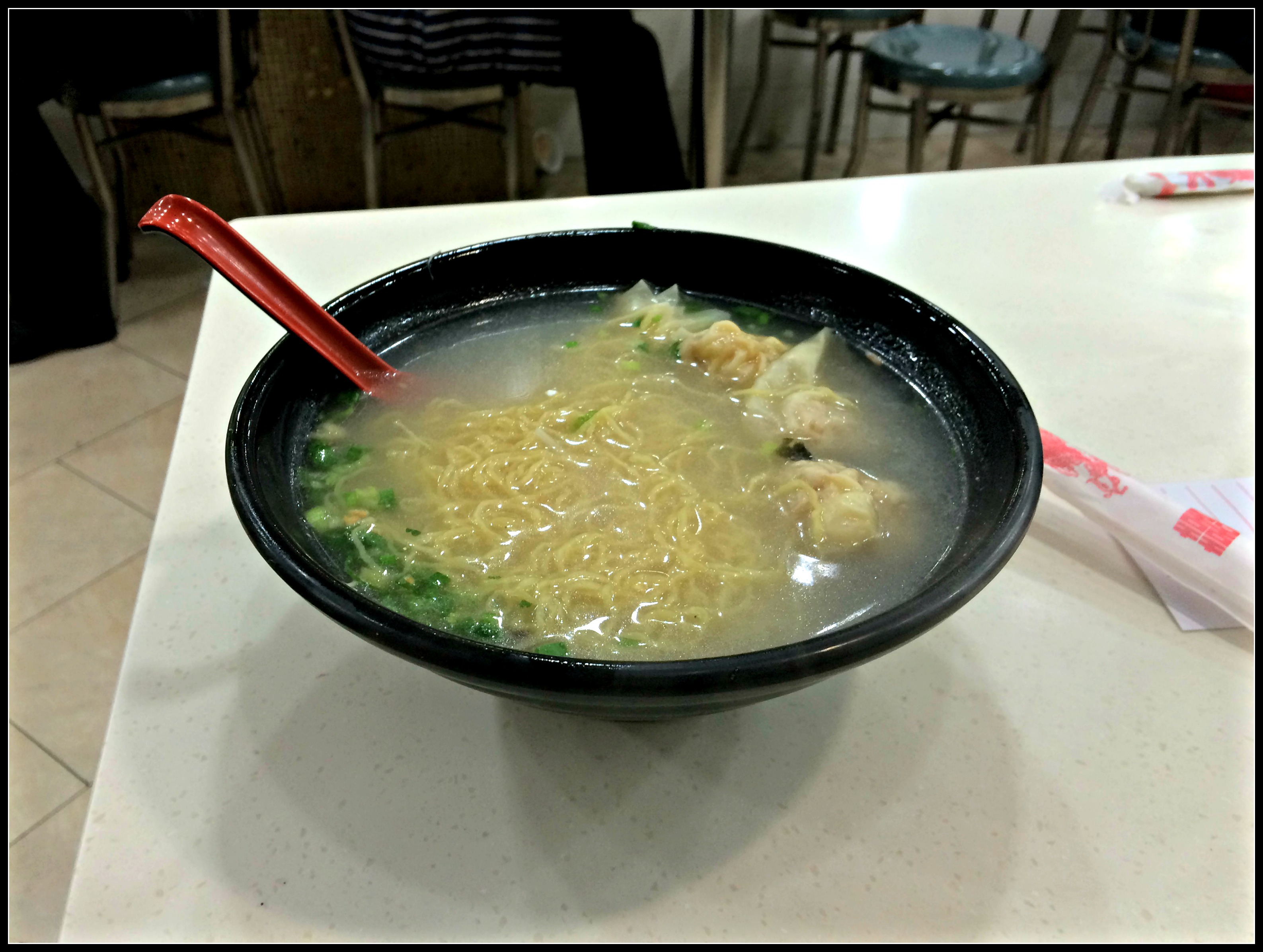

Pictured above is one the better dishes I had in HK, homemade shrimp wonton with noodles and it only cost 34 HK ($4.25, not including the Milk Tea.) This bowl of noodles was stupid delicious. On the opposite hand…
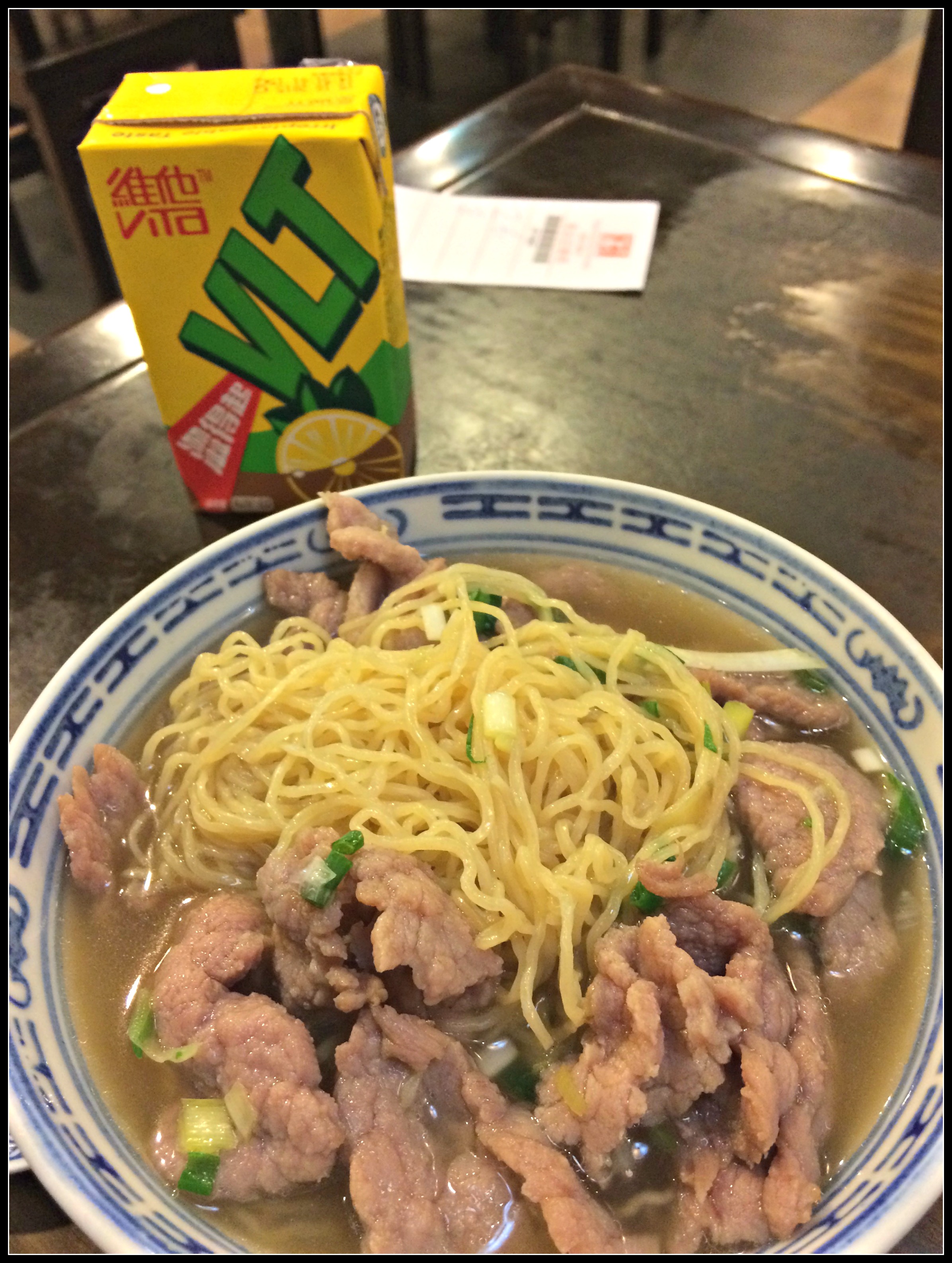

This bowl of noodles also cost 34 HK ($4.25), but was one of my least favorite dishes I had in Hong Kong. It was bland and the meat was crap. What’s the difference? Keep an eye out where you eat. The bowl of noodles that sucked was in a sort of fast-food-looking-place. It was clearly corporate of some kind, but I needed to eat something cheap and quick, so I took the gamble. I was hungry, and made an impulsive decision that I regretted. In contrast, below is where I got the amazing shrimp wonton bowl of noodles.
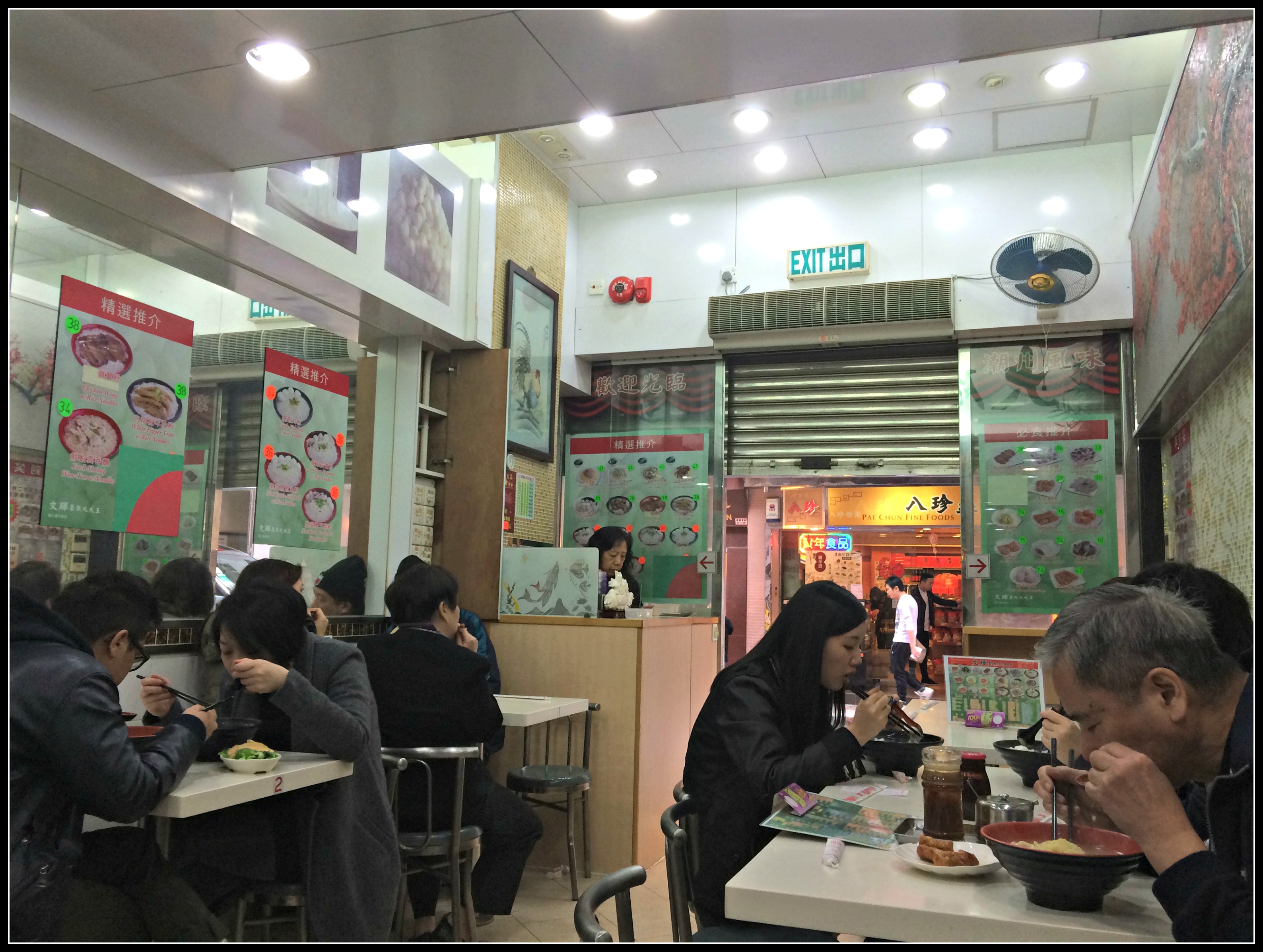

If you see restaurants that look anything like the above picture… eat there immediately. Hole in the walls that resemble this with a high local volume are going to treat you time and time again. I was walking along the road, getting hungry, noticed how small and homey it seemed and how packed with locals it was. Boom. They didn’t even have an English menu. I just pointed to that guy right there next to me and ordered whatever he was having. He seemed to be enjoying it so much. I made the right decision.
Slightly More Expensive
If you are cool with dishing out 50-90 HK ($6.25 – $11.25) and venture to the right places, you will enter the realm of the food-gods. You will honestly never need to spend more than this on food in HK. Never. You can. I did. But you will never have to.
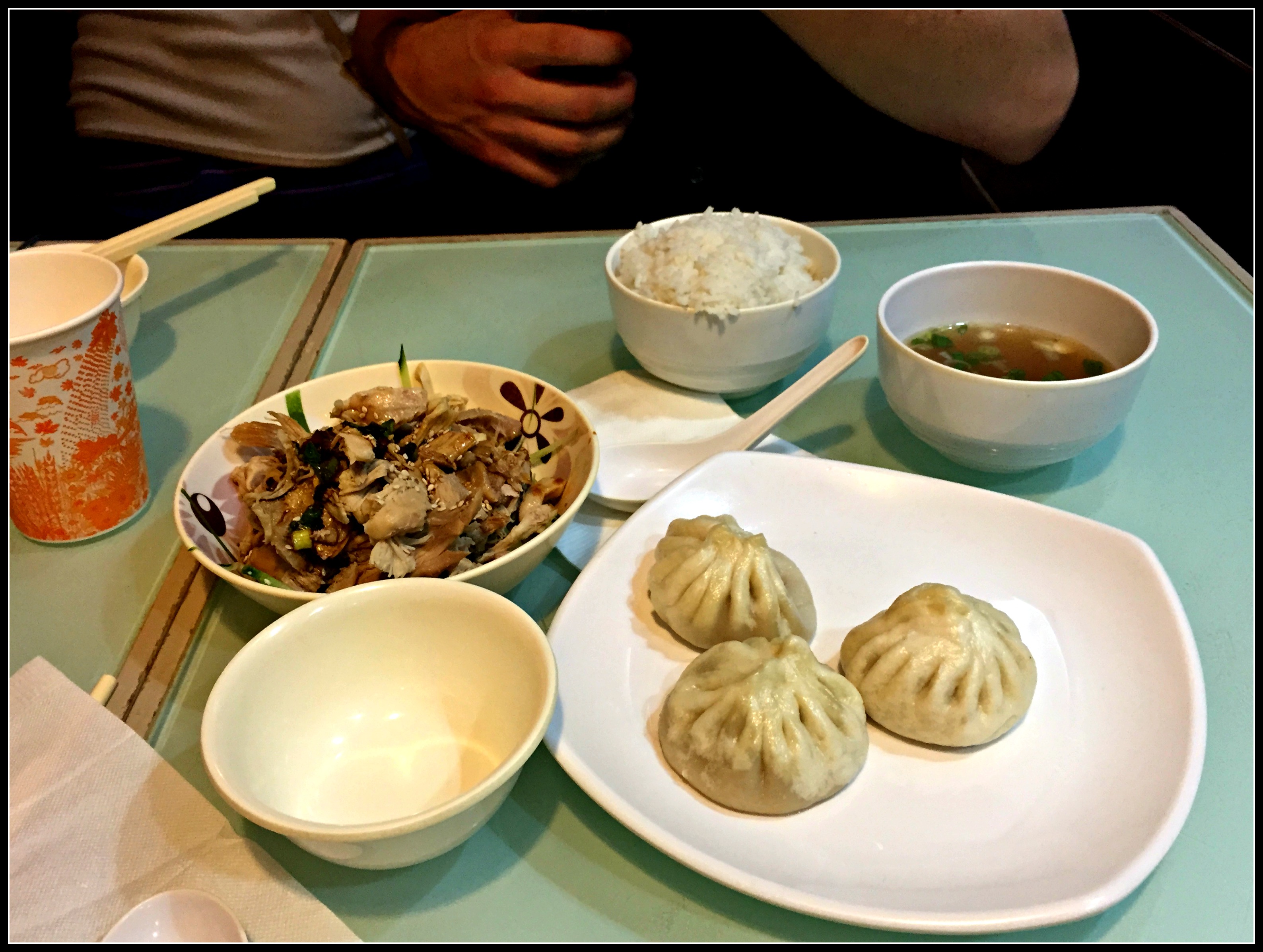

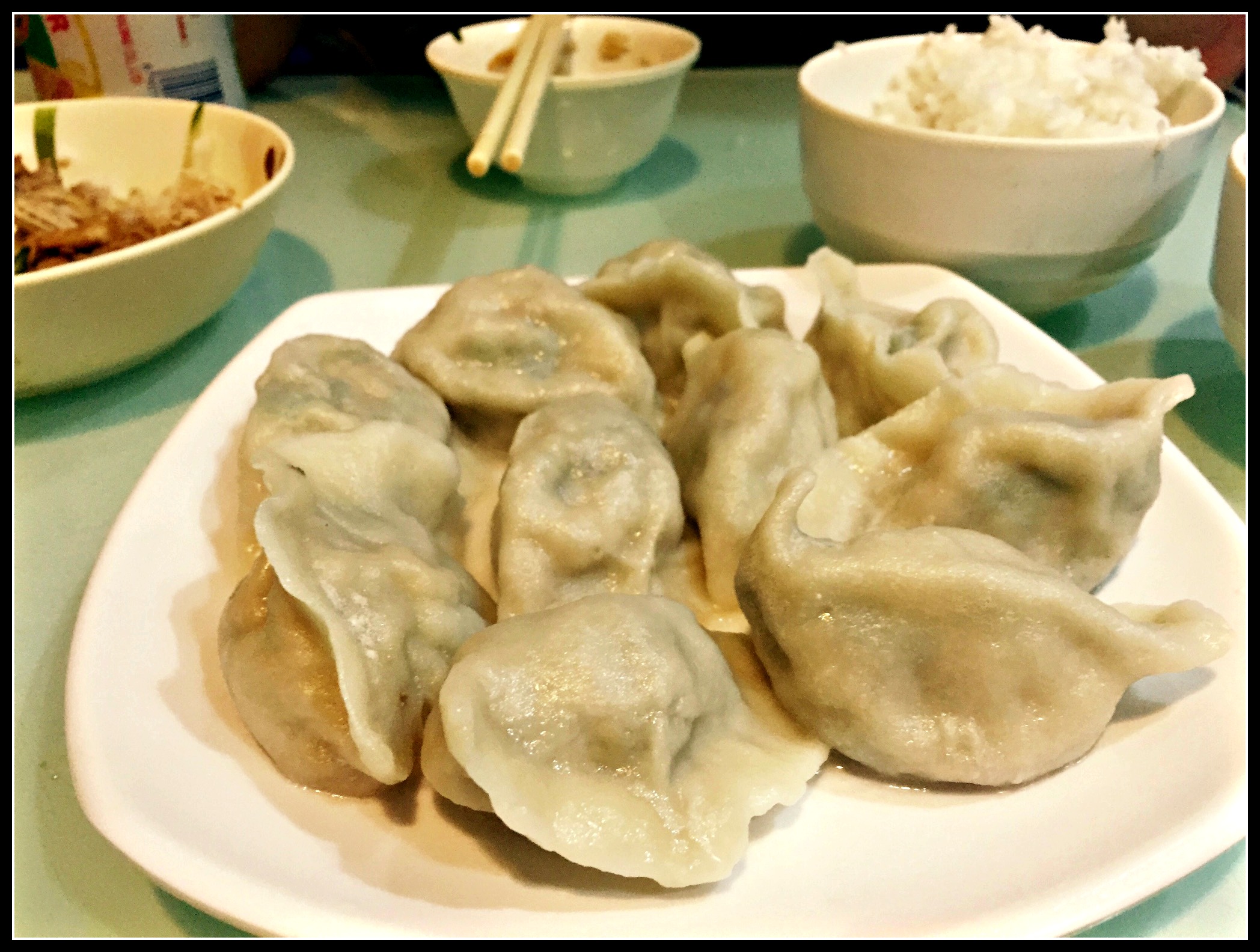

This meal was special. My mate and I went to a hole in the wall, Michelin Star restaurant. We splurged on Goubuli pork buns, smoked chicken with rice, pork and chive dumplings and plenty of beer to compliment. The damage? 180 ($23) HK total, or 90 ($11.50) HK each. It’s hard not to love Hong Kong.
Food in HK will blow your brain to little tiny pieces.
NomadsNation Official Recommendation – If you really want to get to the next-level of food in HK, check out Tsim Sha Tsui in Kowloon and Wellington Street on Hong Kong Island. TST is an incredibly busy part of the city with amazing food at every turn, and Wellington Street is nothing short of an institution in HK.
Hong Kong Harbor (What To Do Cont’d)
You’re going to want to cut down costs when backpacking Hong Kong on a budget, so free activities are highly recommended. The harbor is awesome and it is free.
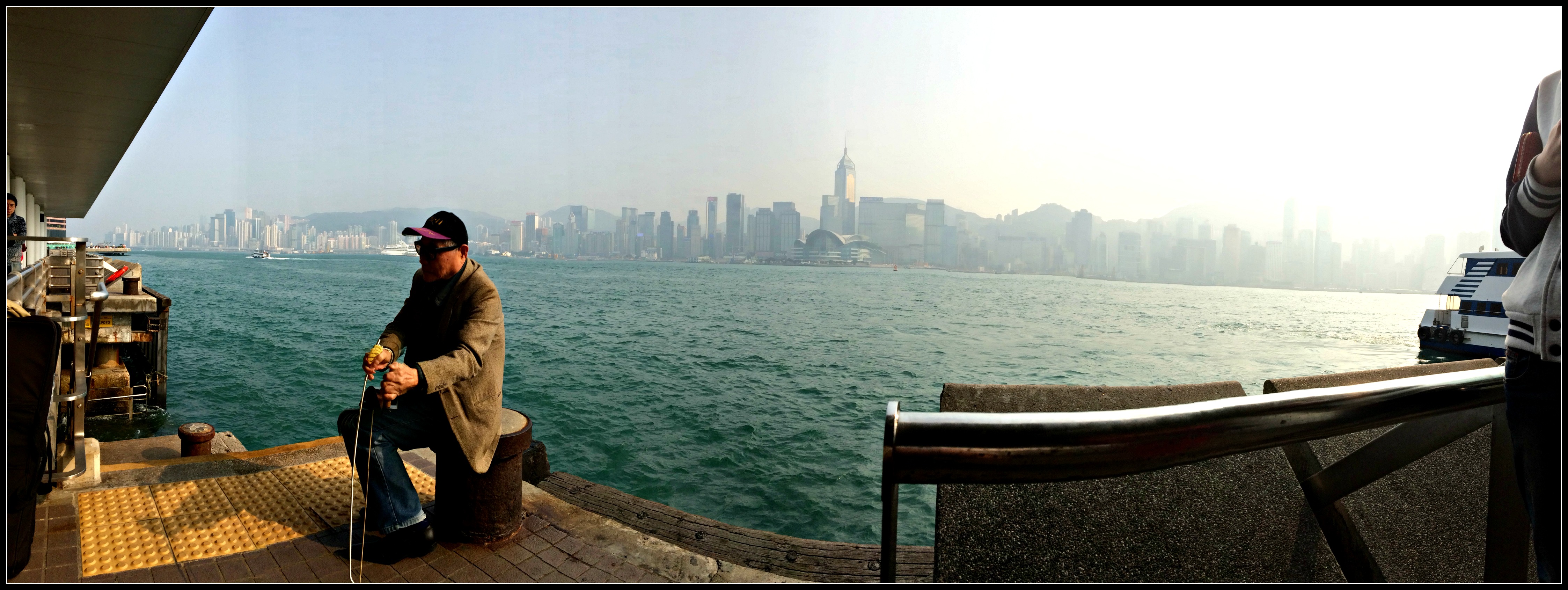

The harbor marks the end of Kowloon (which means ‘nine dragons’ in Cantonese, how sweet is that?) and begins the view of Hong Kong island… and it is epic. HK is considered by many to be the greatest skyline on the planet, and this view only reinforces those claims.
Sometimes there will be street performers (like the older gentlemen pictured above who absolutely killed The Godfather theme song on his saw-like instrument), sometimes it will be a bit smoggy (Above is a 6/10 on the smog scale) but it’s an absolute must do.
Victoria Peak
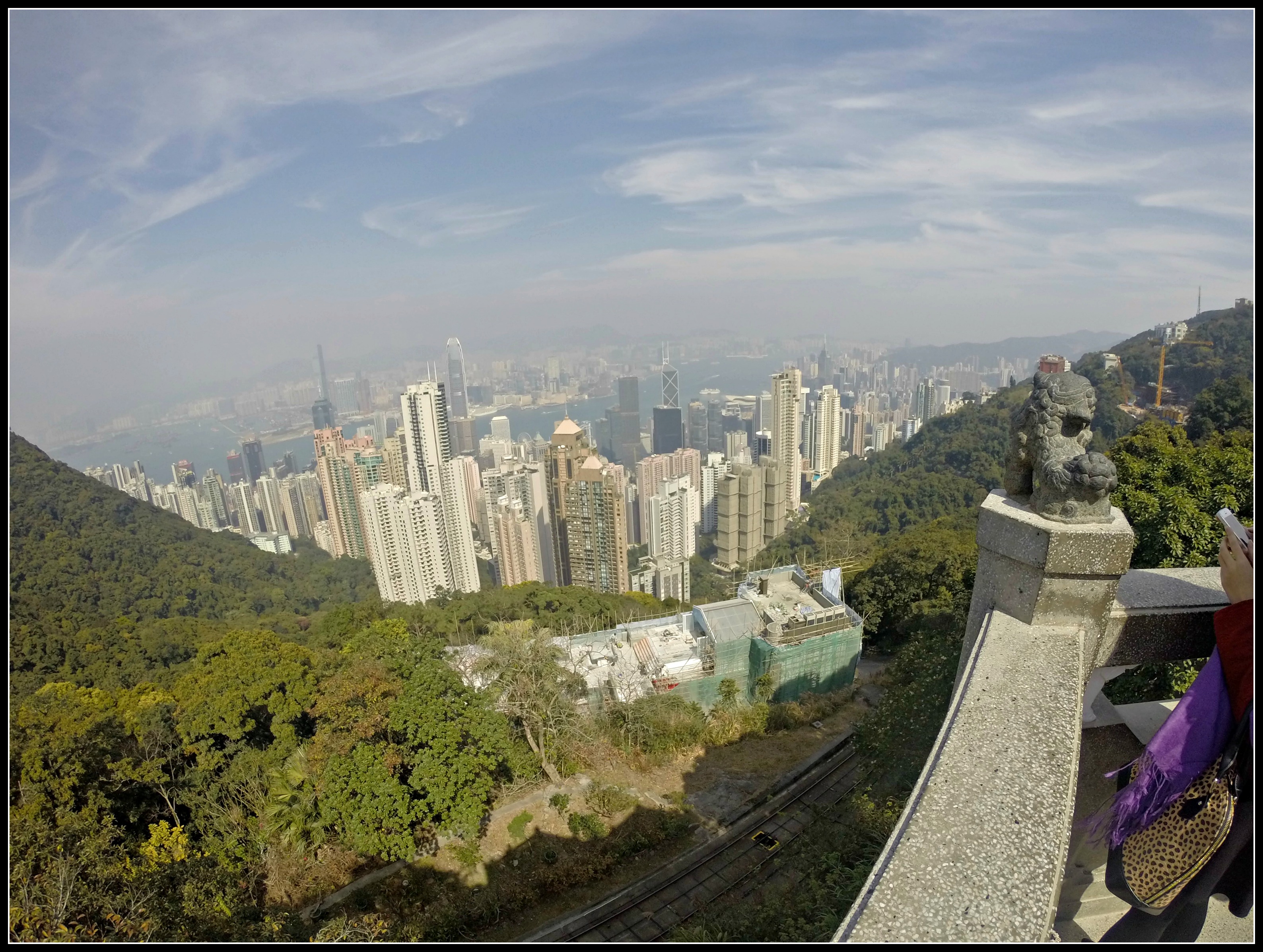

Hong Kong’s number one tourist attraction, and deservingly so. If the view from The Harbor wasn’t enough to convince you HK has the world’s greatest skyline, then the view from Victoria Peak (akaThe Peak) will close the case. For 83 HK ($10.70) you take the tram (pictured below) up 552 meters (1,811 feet) and get an incredible view of the city.
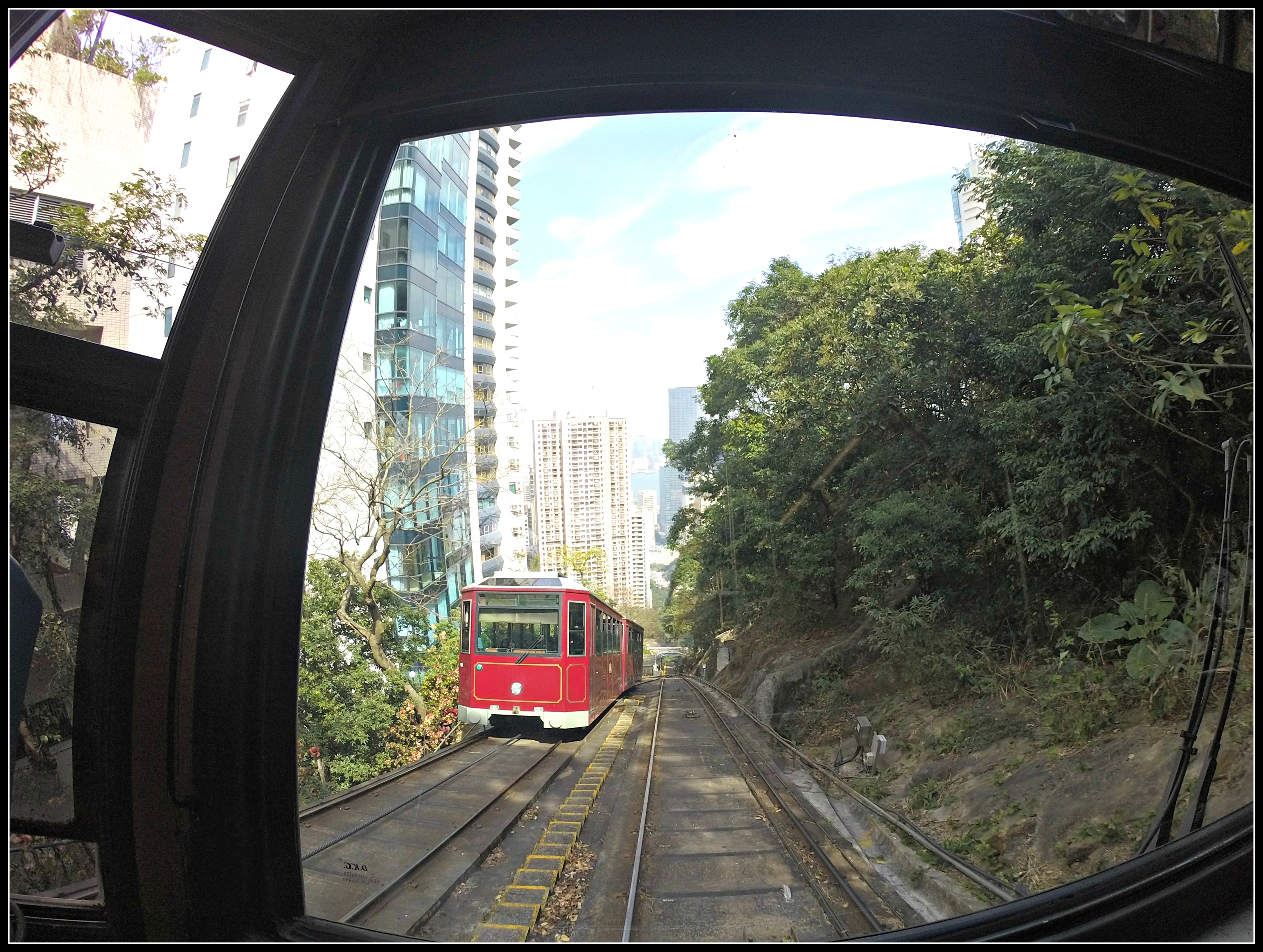

My recommendation? Make a day of it. The Peak will only entertain you for about an hour, but the area is home to some of the best hikes in HK. After taking the views, hit one of the many trails the mountain has to offer. Also if you feel like getting a workout in, there is plenty of basic pull-up equipment available, all of which is for free.
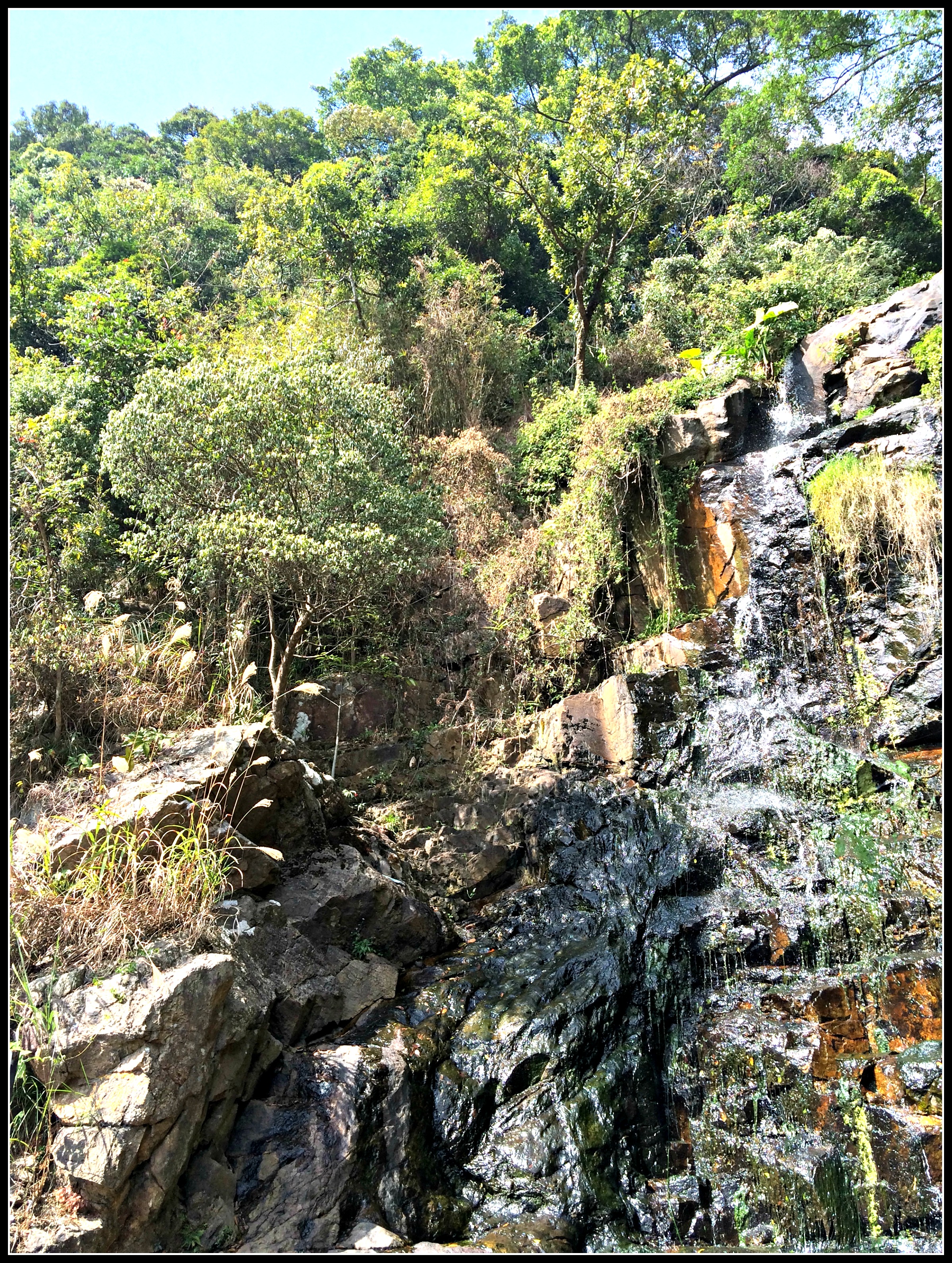

While downtown HK has so much to offer, a plethora of natural beauty is not one of them (like the lovely waterfall above). The hikes at The Peak are absolutely fantastic, and a great way to get away from the noise and get some quiet time in nature to recharge the batteries before returning to the madness.
NomadsNation Official Recommendation – Try to go on a clear day. Seems obvious, but a foggy/smoggy day will quickly turn into a disappointing endeavor. Also, there are public transportation and bus options that are cheaper and less tourist means to reach The Peak, check em out.
Chi Lin Nunnery
33,000 meters (360,000 sq. feet) of pure serenity – this Buddhist Monastery is nothing short of spectacular. It’s free, easy to get to, and amazing by every measurement. This is the epitome of a must do. Trust me.
Big Buddha
No false advertising here. At 34 meters (112 feet tall) and 250 tons of pure bronze, this Buddha statue is big. Also you get a great view of the city as well. Be prepared to climb some serious stairs though.
And most importantly, make sure to go on a day with visibility.
My one and only visit to Big Buddha was filled with enough fog to suffocate a small gorilla. While it was a nice trek, do yourself a favor and only go on a clear day. Totally worth it on a clear day. Not worth it on a foggy day.
Hong Kong Museum of History
Was awesome. Started a bit slow, but as the history of Hong Kong progressed, so did my interest. Recommended for anyone who has medium to serious interest in history. If history really isn’t your thing, then maybe I’d consider passing, but with the knowledge that you are missing out on a truly great museum. It’s 10 HK ($1.29) entry, or free on Wednesdays.
Ding Ding Tramway
Definitely touristy, but it’s really fun. It’s a slowwww ride through the heart of Hong Kong Island, starting or ending in Kennedy Town (west point) and Shau Kei Wan (east point), and the sights and views are pretty awesome.
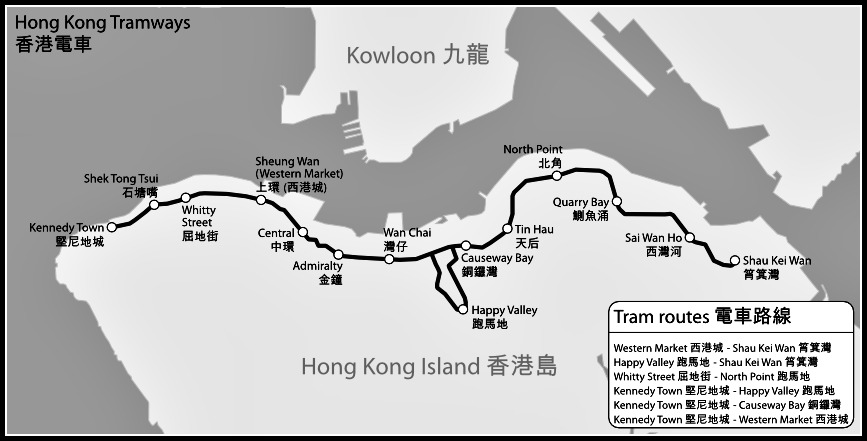

It’s technically public transit, so you are allowed to jump on an off any time, and for less than 3 HK ($.39) it’s hard to argue with.
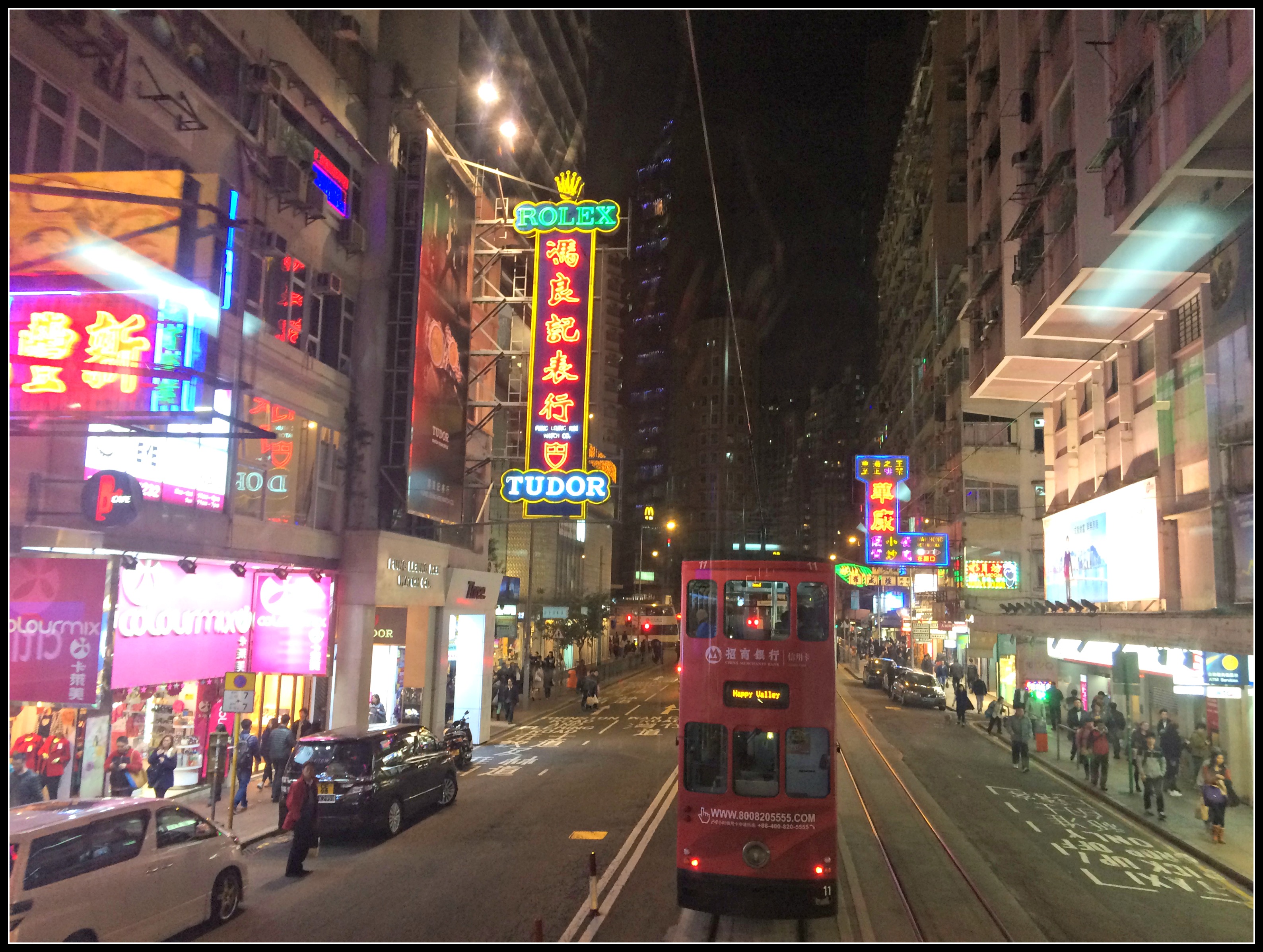

Grab a milk tea, sit on the top deck, sit back, relax and enjoy. It’s really cool.
Ozone
The International Commerce Center is the world’s 4th tallest building (by floor count), and at the the very top, 118 floors above the ground, at 574 meters (1,833 feet) is the world’s tallest bar. Meet Ozone.
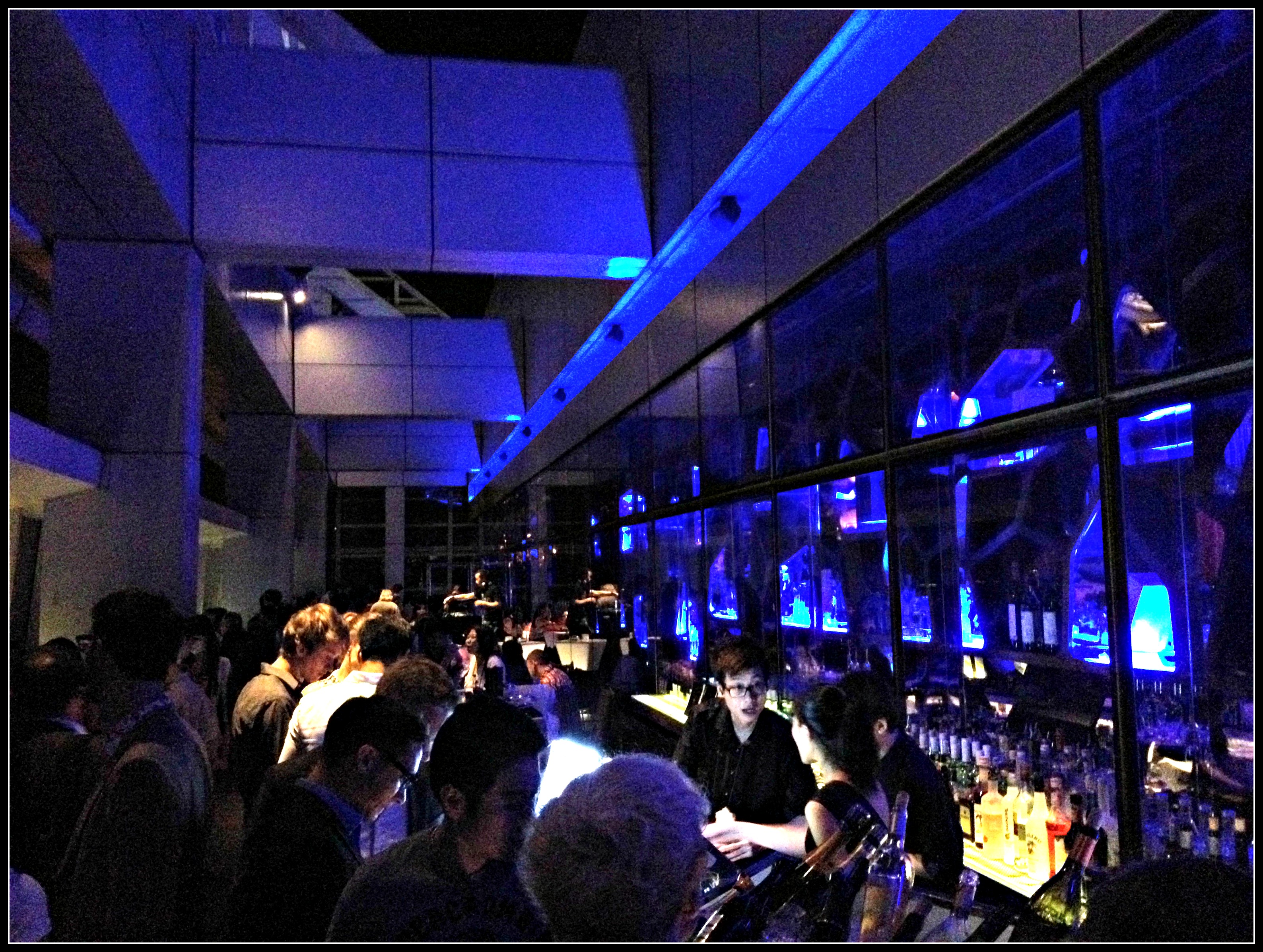

The bar is modern, sleek, full of beautiful people and expensive as all hell, but surprisingly free to get into. The view is astonishing, particularly at night when the HK skyline is lit up. It’s a very empowering feeling knowing that you are at the top of the world, and the fact that it is free to get into makes it a must do.
If you do want an alcoholic beverage, brace yourself before paying the bill. A single beer cost me around 200 HK ($25.00). I don’t like that sentence, but it happened. I’ve never milked a Heineken so slowly in my entire life.
If you want the view of a lifetime, take the free elevator ride up. It’s worth it. You will figuratively feel, and literally be, on top of the world.
Alcohol
Is not cheap in HK, at least not in bars. If you go out, expect to pay 30-50 HK ($3.80-$6.40) for a pint. The alternative? Club 7 baby.
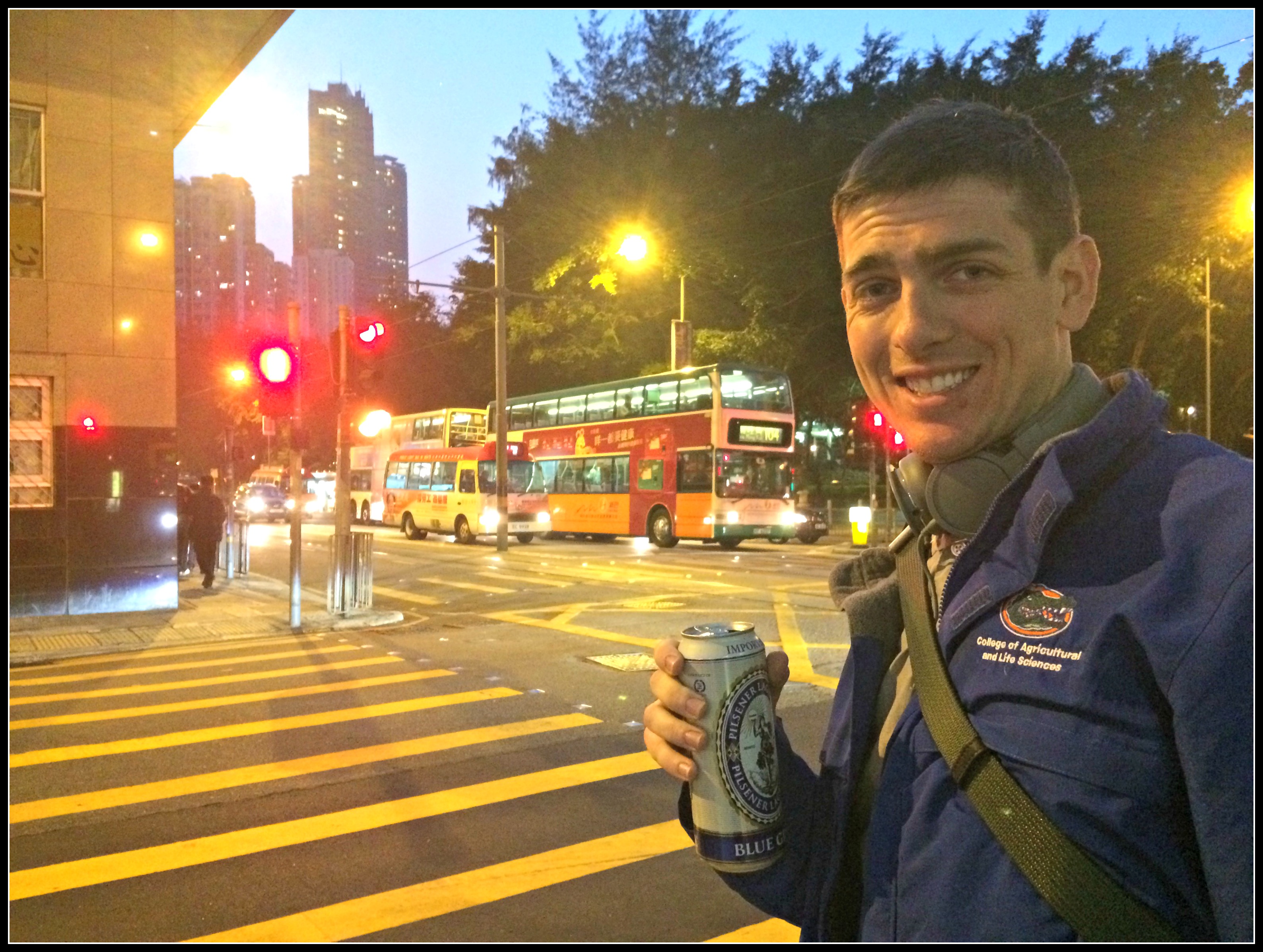

If you’ve spent any time anywhere in Asia, you know 7/11’s are one of the more ubiquitous sites on the continent. One cool thing about HK is that it is completely and 100% legal to drink in public. As demonstrated by my friend (and NomadsNation contributor) Bernie above, you can walk most anywhere in the city with a beer in hand. It’s awesome. So, if you are looking to get your drink on but don’t feel like paying bar prices, stop by Club 7, grab a few Tsing Taos, and drink away. It’s very common to head to parts of town where the night life is bumpin’, buy your beers from the closest 7/11, and enjoy the evening outside on the street, all while spending a fraction of the money.
Where to Stay (HK Accommodation 101)
Many will argue this is the greatest challenge to one’s budget when traveling to Hong Kong. Finding affordable lodging in this city used to be challenging, but with the rise of CouchSurfing, work exchange, Air BnB and hostels, Hong Kong lodging has now entered the realm of the budget traveler.
Let’s start with free, then move our way up.
CouchSurfing
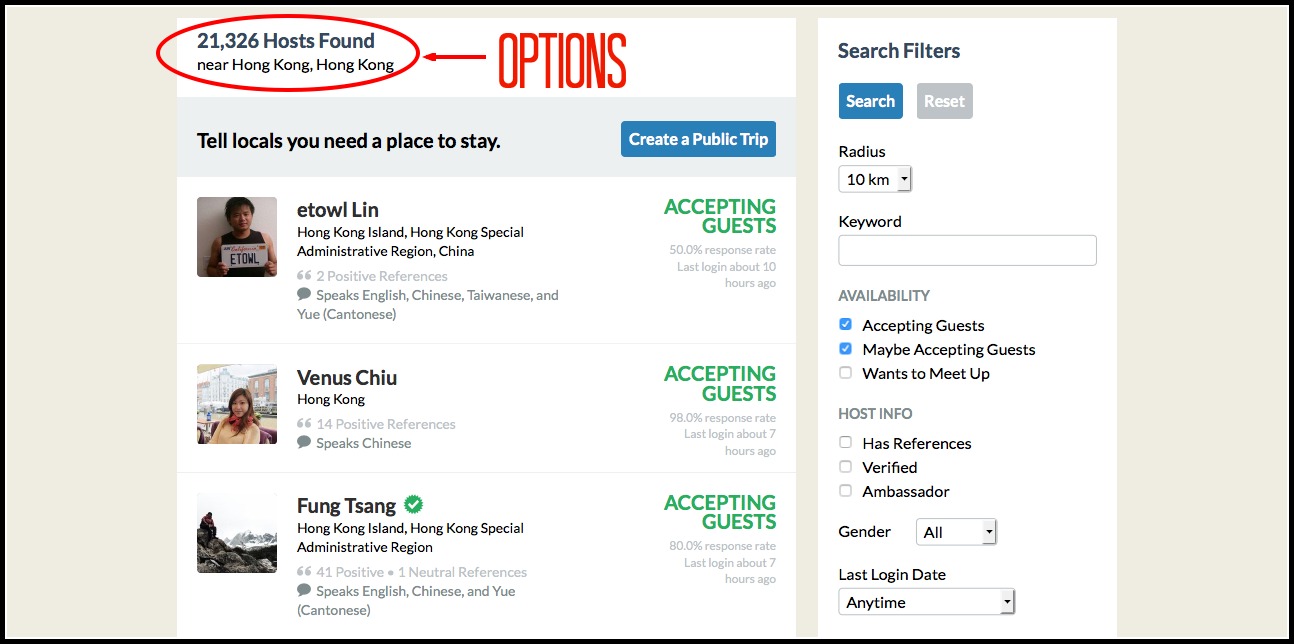

Couchsuring has a phenomenal presence in major cities within Asia, and Hong Kong is no exception. As of writing this, there were 21,326 surfers who may have couches within 10 km of Hong Kong. If we wish to get a tad more specific…
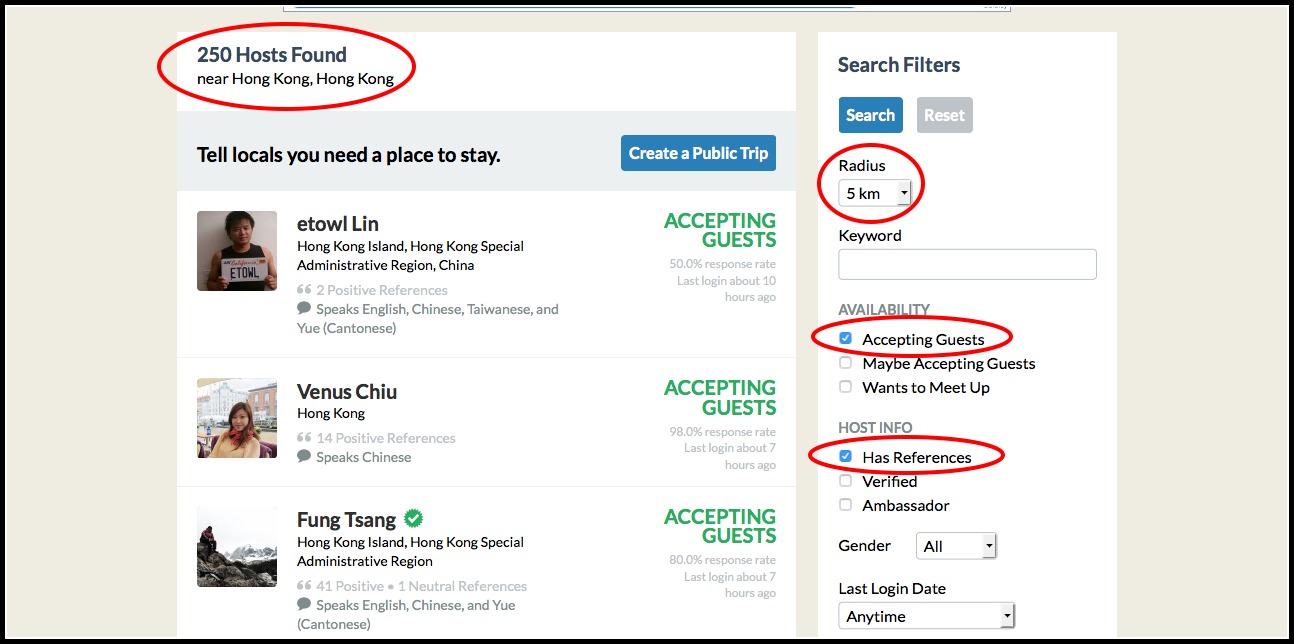

We can see just how incredible of a resource Couchsurfing can be. I changed the radius to “within 5 km”, only hosts who were “absolutely accepting guests” and reducing the results to those only that“ha(ve) references”. There are still 250 hosts available. CouchSurfing is one of the best ways to save money on travel. It will help you save money, and the more money you save in Hong Kong, the more milk tea you can buy and drink.
Work Exchanges
Work exchanges enable nomads to travel cheaply. The three most popular are WWOOF, HelpX and WorkAway. Typically these sights are hundreds times more popular in Oceania, Europe, and North America, but opportunities can still exist in Asia. Let’s look.
WWOOF
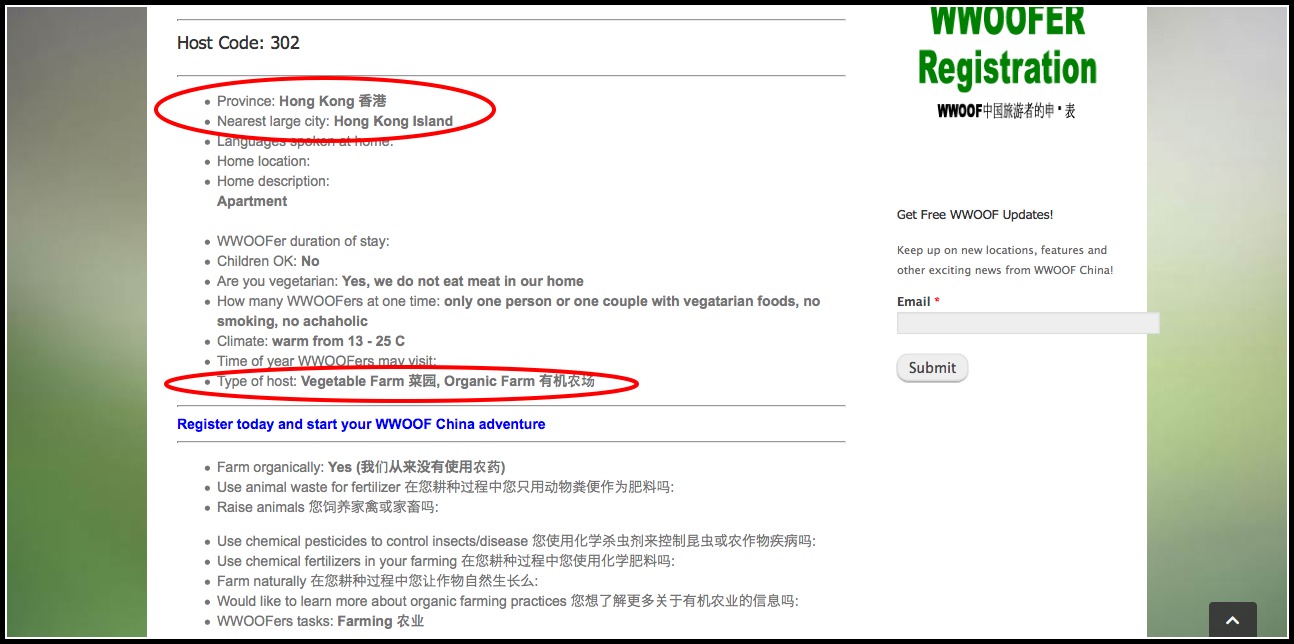

Honestly, considering the fact that WWOOFing is an organic farm work exchange program and Hong Kong is a massive concrete jungle, I was surprised to see anything pop up, but there were a few options. As previously mentioned, work exchange isn’t as popular in this part of the world, but as with most things, opportunities absolutely exist. Checking HelpX…
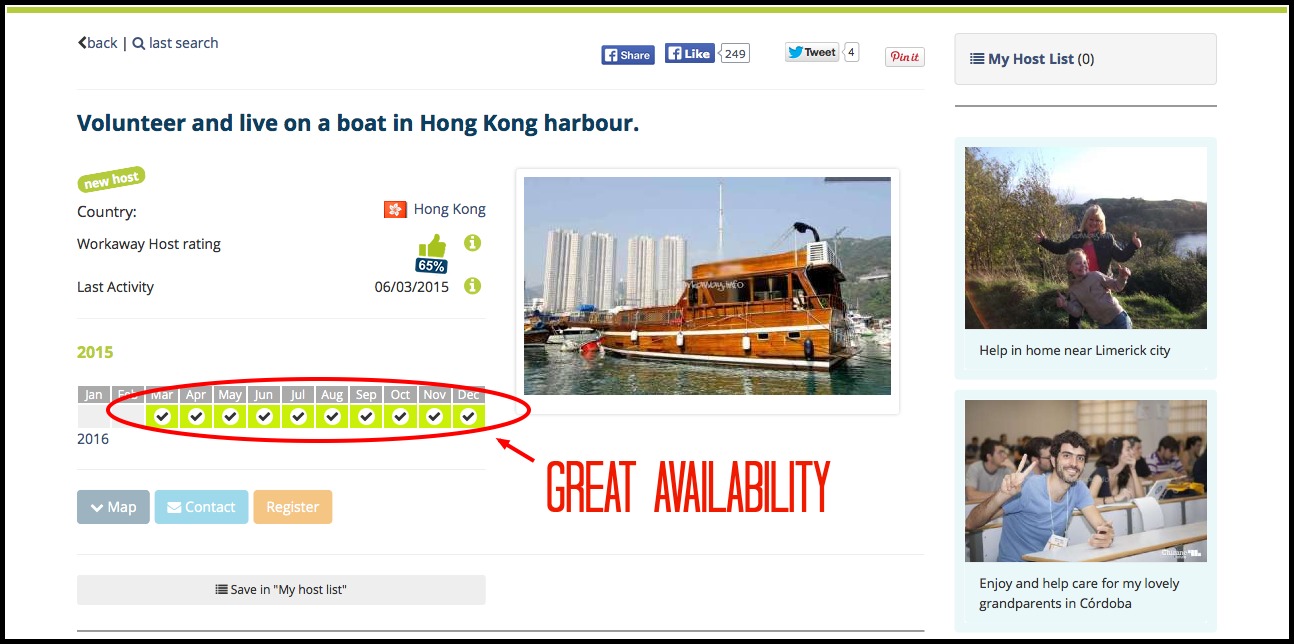

There were a few interesting work exchange opportunities, like the cool one above where you can live and work on a boat in the harbor. Checking Workaway…
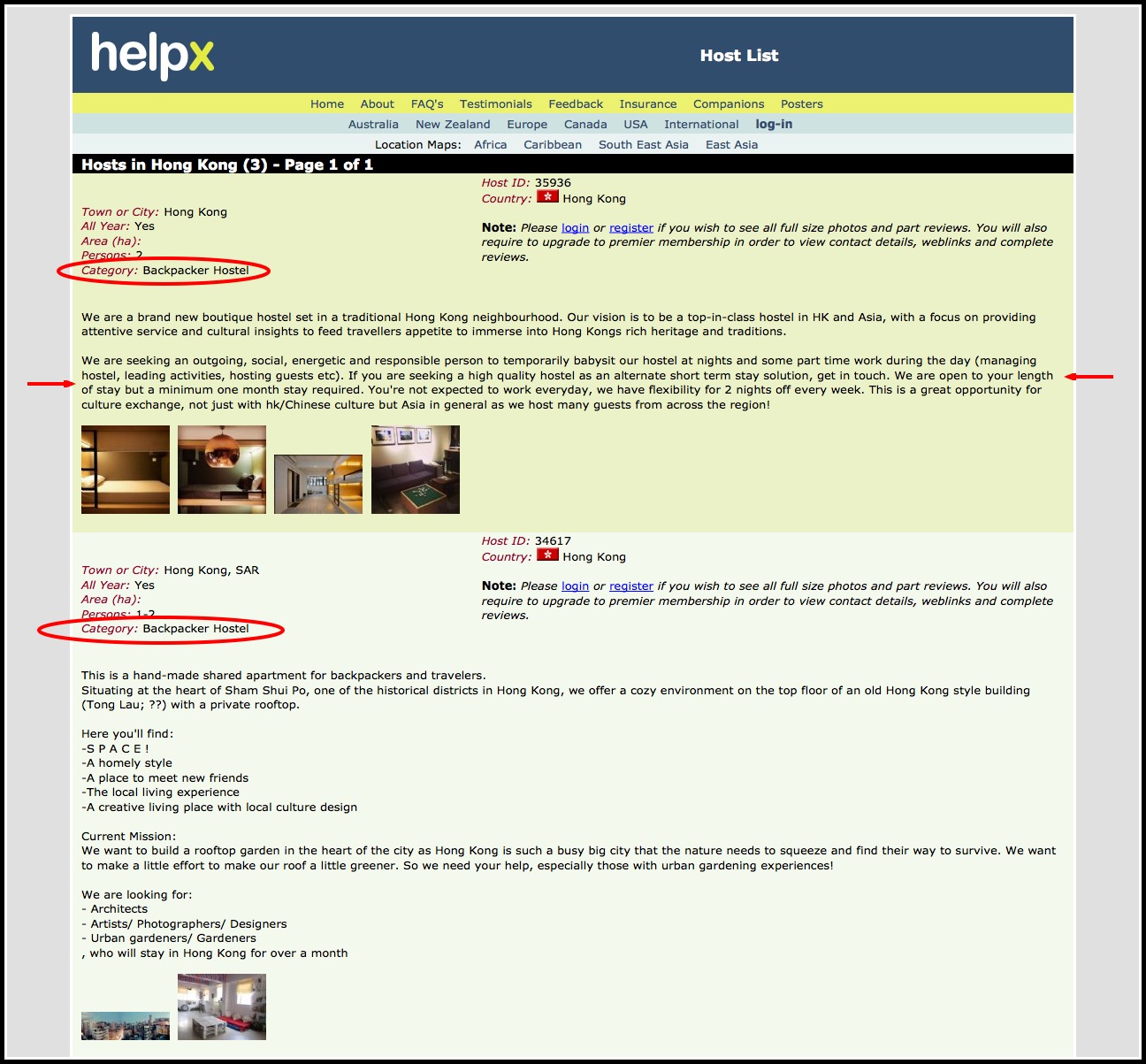

There isn’t much, but WorkAway pulls up a couple of cool options working with hostels Hostel work is a great way to get free accommodation, more on that here.
Airbnb
If you are familiar with Airbnb, you will be pleased to know that HK is as well. While there are more defined Airbnb cities than this, depending on your price range, there are still plenty of deals to be found.
Airbnb can benefit many people in many traveling situations, but the highest recommendation, and best bang for your buck, will be if you are traveling as a couple. If you a couple uninterested in sharing dorm beds, look no further.
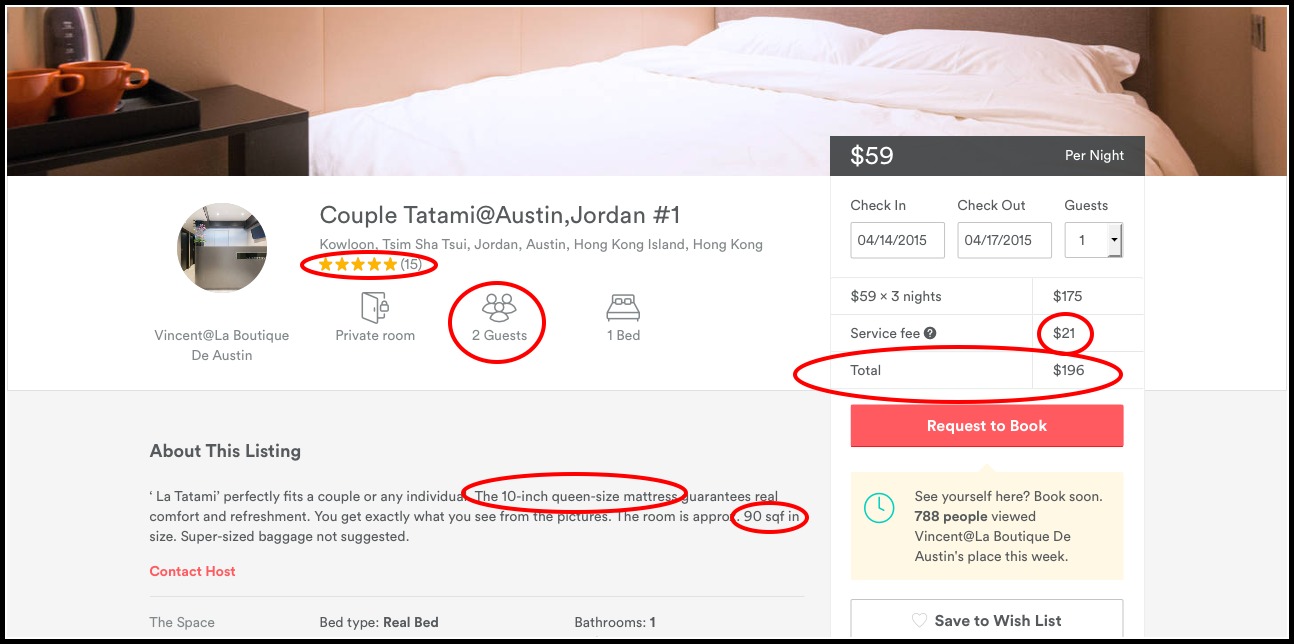

For a private 1 room or studio apartment, expect to pay at least $50 a night. Remember, this is city life, so the rooms (like the one pictured above at a tight 90 sqf) are going to be very… cozy. But, those in favor of Airbnb typically need no further motivation. The apartment above is a perfect example of what to expect from a private room through Airbnb, and there are hundreds more offering very similar accommodation.
Hostels
Are a strange thing in HK. Although they exist, they are in some weird mutative form. The city hasn’t yet fully embraced them, and where they do exist, they are far from the standard of their Asian counterparts… particularly in price. The cheapest Hong Kong dorm beds are running around $20 a night, but might be found for slightly cheaper if booked in advance. Definitely a bit pricey for a mixed dorm, especially considering that Shanghai and Beijing have dorm beds available for less than $10. But, this is Hong Kong.
Hostels are spread throughout the entire city, but you will find many of them located in an area of Kowloon called Chungking Mansions. It sounds cool, and it is pretty cool, albeit slightly dodgy. It’s a large building that supposedly has the most languages spoken in the least amount of square feet in the world. Chungking is a hotspot for travelers, and serves as a “gathering place” for many international minorities, including, but not limited to, Indians, Nepalese, Bangladeshis, Ethiopians, Nigerians, Israelis, and many more. The first two floors of the Mansion are a series of shops, markets, exchange offices, and most importantly, restaurants with world class food. The next 15 floors are dedicated to hostels, budget hotels and guest houses.
Chungking is an awesome visit, and probably even more interesting of a stay. It’s safe, it just has some serious character.
Travel Hackers
Big city. Hong Kong has you covered for your travel hacking pleasures. Hyatt, Marriott, Hilton, Ritz, Starwood, Hong Kong’s got you. Only let down? No Club Carlson properties! I was hoping to use some of my 110,000 CC points on this trip… Guess next time.
Consensus (Accommodation)
First off, try Couchsurfing. Plenty of hosts. For the solo traveler, hostel beds (most likely in Chungking) are easily the next cheapest option, but if you are traveling as a couple or wolf-pack, I would highly recommend looking into a guesthouse, or preferably Airbnb.
Getting Around
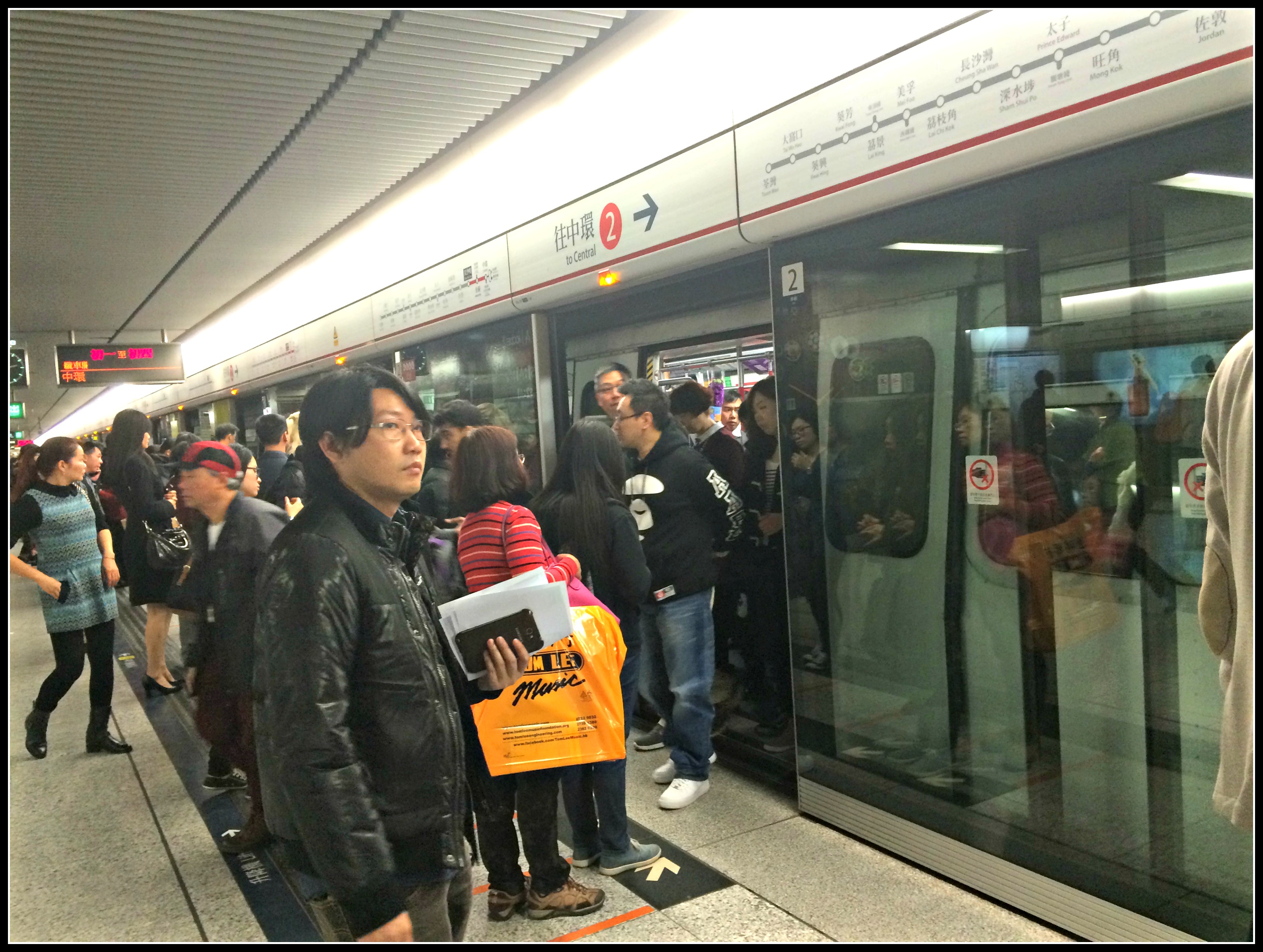

HK has one of the world’s cleanest and most efficient public transport system on the planet, the MTR. It is spectacular, easy to figure out, fairly affordable and will deliver you to most anywhere in the city you wish to go. To use the MTR you either need to purchase individual tickets, or….
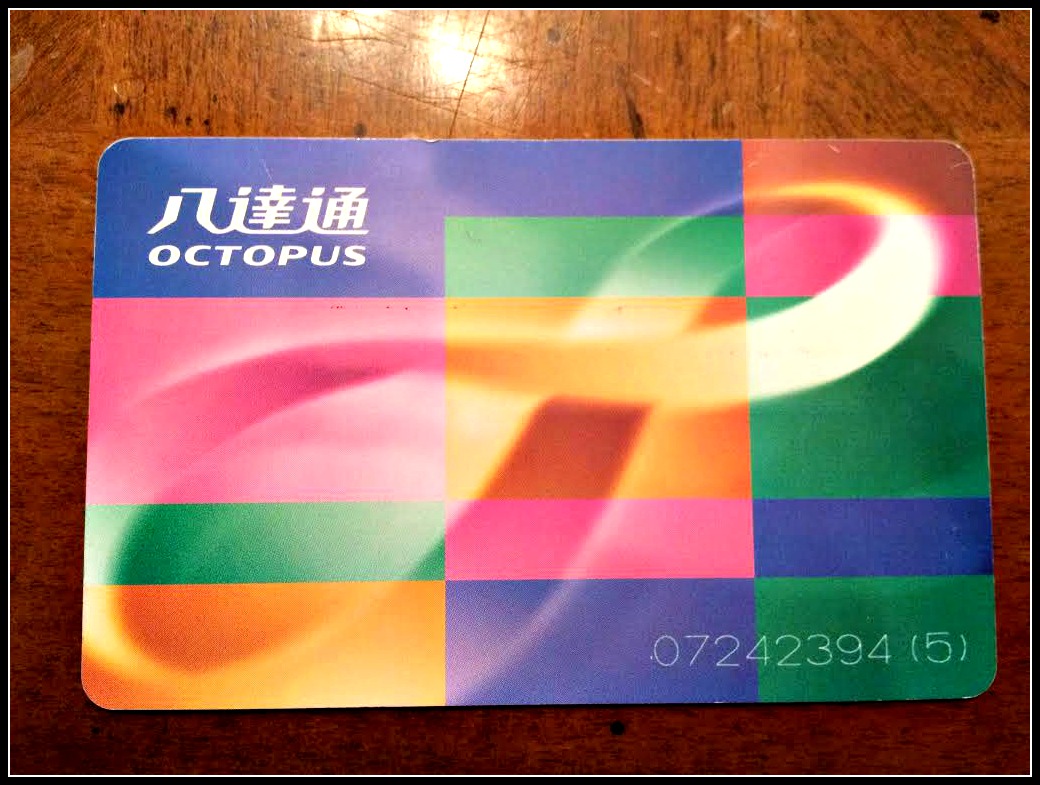

… just buy yourself an Octopus card. Technically the card costs 150 HK ($19.32) but comes loaded with 100 HK ($12.88) for immediate use. If you are spending any more than a few days in HK I would highly recommend picking one up. It will save you a ton of time and hassle. The card is used for all forms of public transportation in the city (including the Peak Tram), and is an accepted form of payment at many retail stores as well, most importantly being 7/11.
Weather
HK is a monsoon-influenced humid subtropical climate. Summers are rainy, hot and quite humid. Fall is lovely; sunny and pleasant. Winter is cool to cold and very dry. Spring is fairly nice all around.
Miscellaneous
Tipping – Greatly depends on where you are dining. If you are eating at a cheaper restaurant where you pay at the counter, tips are not expected, but leaving some change never hurts. If you are dining in fancier establishments, 10% is the norm, but make sure the bill doesn’t already have an included service charge…many times it will, and you’ll be in the clear. Throwing taxis a few extra bucks is fine as well.
Losing Face – One’s dignity and position in society in HK (and all of China) is extremely important. Extremely. If you find yourself getting angry, do not yell, do not embarrass anyone, and do not criticize anyone especially in front of other people. These socially embarrassing situations are lethal in Chinese society. Basically just don’t be this guy.
Conclusion
HK can be whatever you want it to be. If you utilize Couchsurfing , avoid copious amounts of alcohol, and stick to the food recommendations in this guide, you can get away with $35 a day. If you pay for lodging, and splurge on booze and food, expect to pay $70 a day and upward. Backpacking Hong Kong on a budget is more than doable, and highly recommended.

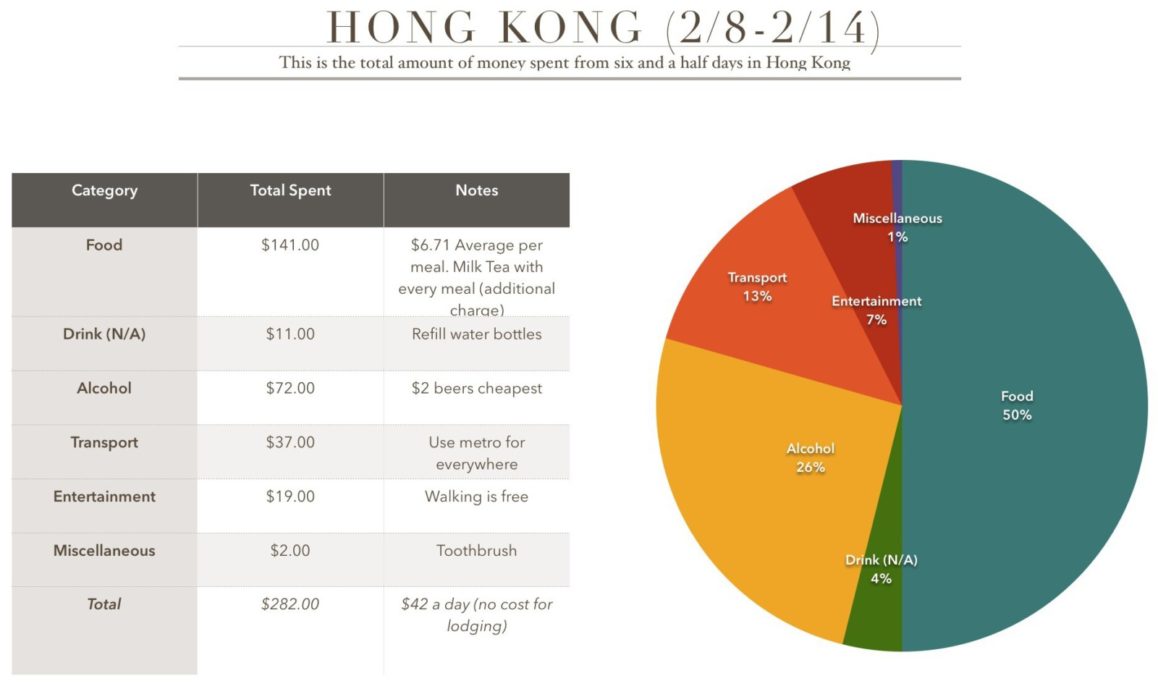

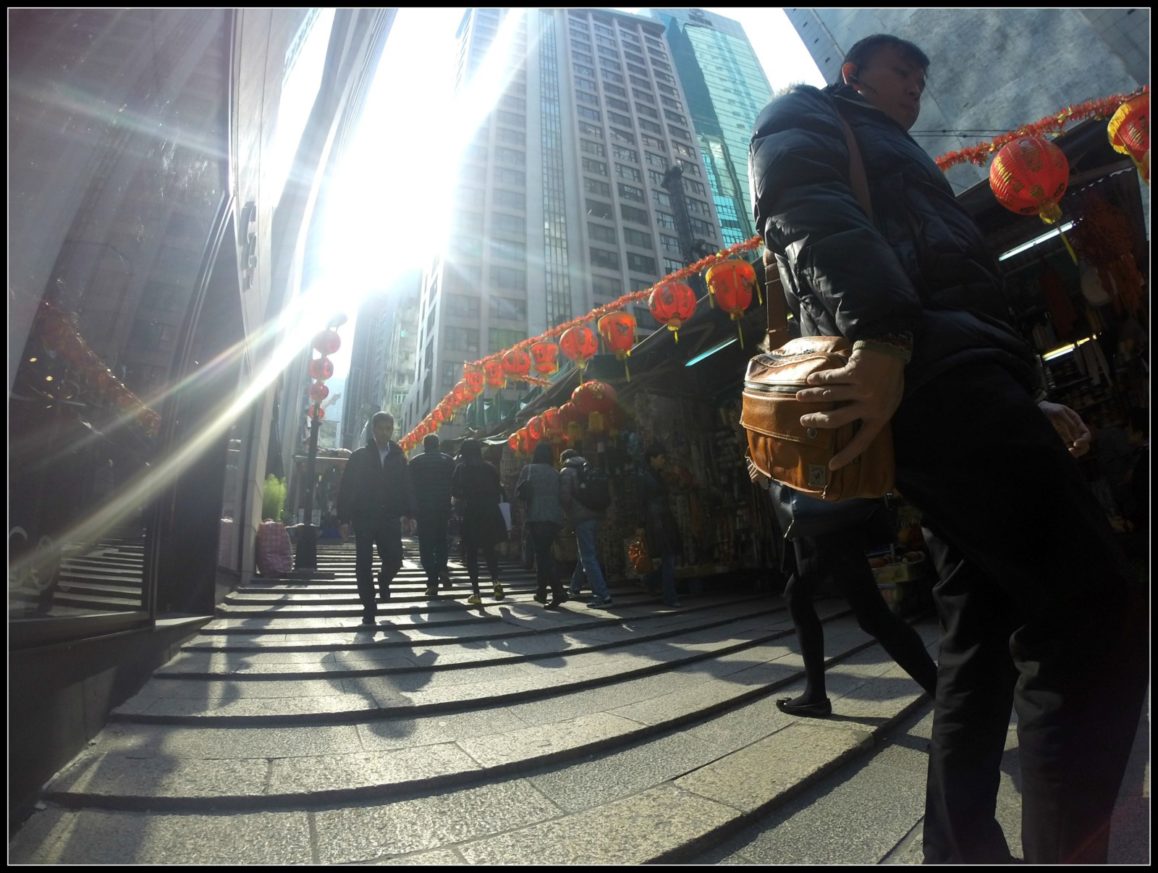
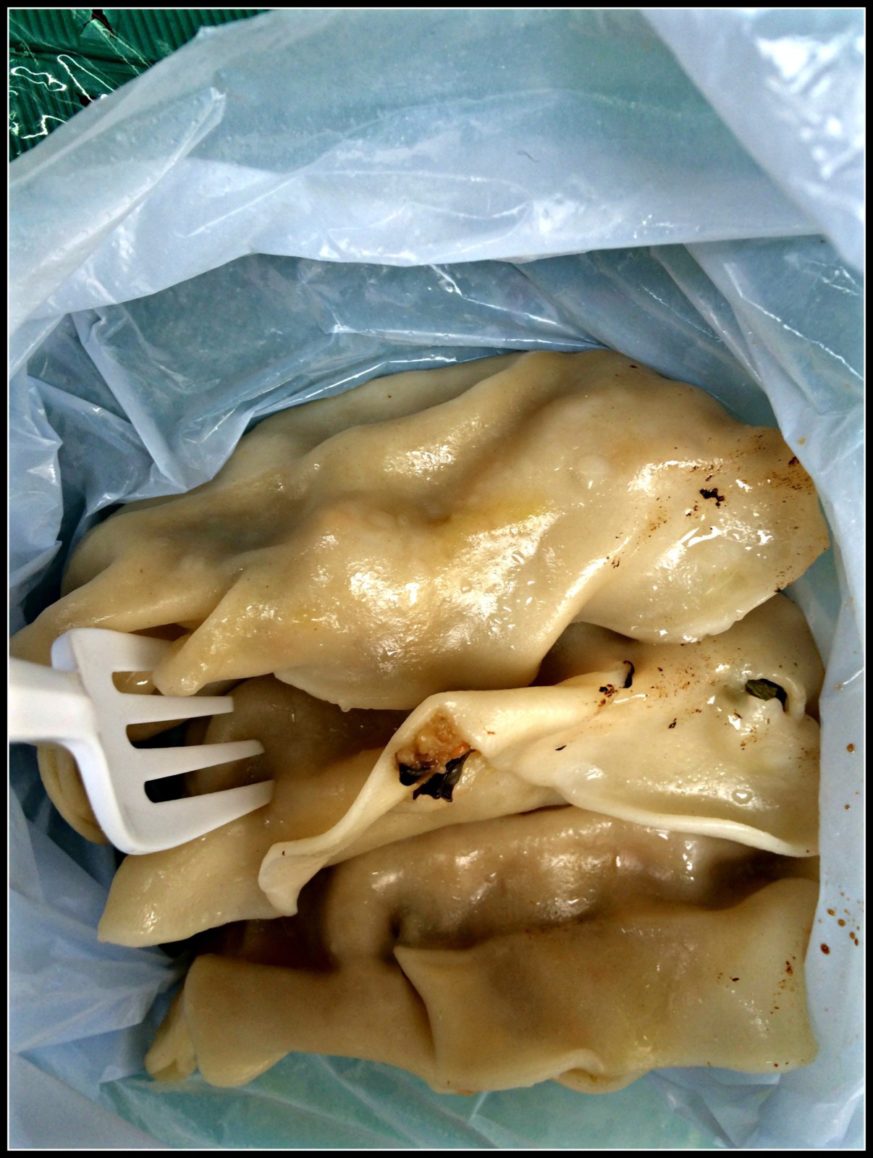
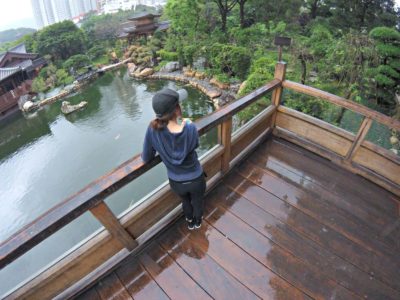
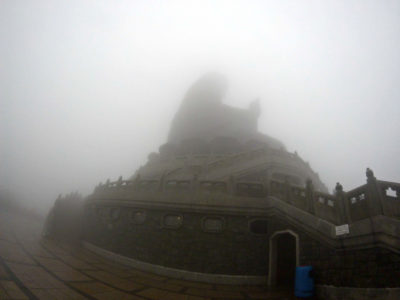
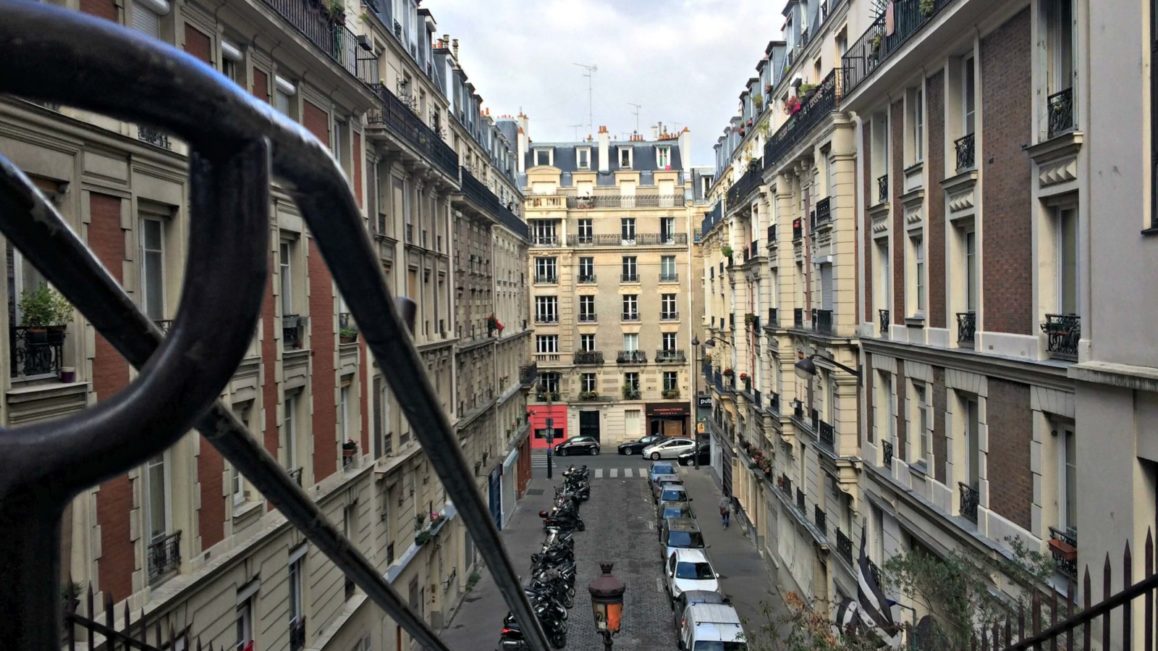

Love how this was written. Solo traveling to HK in a few months and this post is getting me fired up! Thanks, Aaron!
P.S.: What’s the name of the Michelin-star restaurant you went to?
Wang Fu – 65 Wellington Street (insert drooling emoji)
Enjoy Maria!
Nice write. HK is calling me… I recently finished a trip to Korea and like you sometimes had to point at food others were eating ha.
Thanks Paul! Looking forward to making my way to S. Korea soon
Great post! My husband and I hope to visit HK soon. Looks like the fall would be the better time for us. Those pictures of the hiking look outstanding. Seems like there is a decent balance between the concrete and the dirt, which is a must for me. Thanks NN!
You said it best Victoria, the balance is a must!
Having lived out here a bit longer now, I’m seeing just how many amazing hikes there actually are. Hong Kong is the s**t.
When you make it out here get ahold of me at Aaron@NomadsNation.com and I’ll let you know the best places to eat and hike.